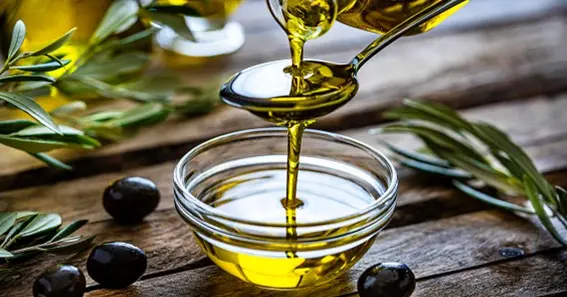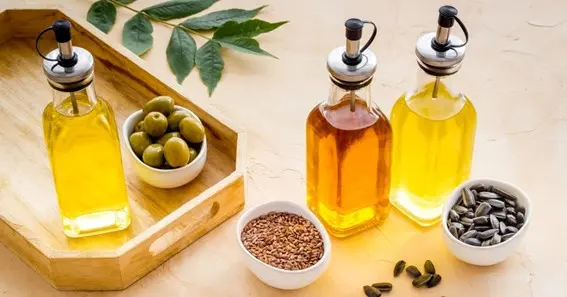What is vegetable oil made of? Vegetable oil is made from plant seeds or fruits, such as soybeans, sunflower seeds, or olives, through extraction and refining processes. Among other things, seeds, fruits, nuts, and grains are where veggie oils come from. They are an essential part of modern food. Their health benefits, different tastes, and many cooking methods make them popular worldwide. What’s in food, and how do different vegetable oils work? Learn this before you buy food or take care of your health. In this article, we discuss what is vegetable oil made of and more about it.
What Is Vegetable Oil Made Of?
Vegetable oil is made from plant seeds or fruits, such as soybeans, sunflower seeds, or olives, through extraction and refining processes. Triglycerides make up most vegetable oil. Make them by connecting three fatty acid chains to glycerol. Three fat acids exist: saturated, monounsaturated, and polyunsaturated. Many individuals receive it from fruits (such as coconut and olive), nuts (like peanuts), and cereals (like popcorn and soybeans). The different parts of vegetable oils make them taste different and give them health benefits. These parts will help you pick good oils and make food taste good.
Understanding Vegetable Oil

As in above, we discuss what is vegetable oil made of, now you should know that veggie oil comes from plants like olives, sunflower seeds, and soybeans. Today, it’s an essential part of cooking and making food. These oils are checked to ensure they are clean for many business and cooking tasks. You can use a cleaner or press them to get them out. To better understand their role in food and cooking, learn about where they come from and how they are made.
Nutritional Composition
You can tell the nutrients in different food oils by how many fatty acids they have. When oils like coconut and palm get to room temperature, their heavy fats make them hard. If you eat too many of these fats, they can raise your cholesterol. They’re good for your heart and melt in your mouth when you mix them with water. Soy and olive oils have a lot of them. Soy, peanut, sunflower, and safflower oils all have polyunsaturated fats. These fats contain omega-3 and omega-6 fatty acids, which are crucial for many body processes.
Extraction Methods
As you know what is vegetable oil made of, you should know the process used to get food oils dramatically impacts how they taste, how healthy they are, and how useful they are for cooking. Chemicals and heat can destroy healthy nutrients and tastes in oils. Cold-pressed or expeller-pressed oils keep more of these nutrients and flavors. Over time, the process of making these oils can remove some of the minerals and vitamins that are in them. While processing removes impurities from refined oils, this may lower their nutritional value. On the other hand, it raises their smoke point and makes them safer. Now that you know how to get oils from plants, you can pick oils that taste good for you.
Culinary Uses
Before you use them in food, you should know what is vegetable oil made of, how they taste, how much smoke they make, and how healthy they are. Peanut and sunflower oils are great for frying, sauté, or deep-frying meat because they don’t break down at high temperatures. The mild flavors of these foods make them useful for a wide range of cooking styles. Its taste is different from other oils, and people love it. It’s often added to salad dressings, marinades, and finished foods to make them taste better without spoiling the delicate smells.
Health Considerations
Picking food oils based on how many fatty acids they have is very good for your health. Most of the time, monounsaturated and polyunsaturated fats are better for you than heavy fats. They can help lower your chance of heart disease and cholesterol. Polyunsaturated fats contain omega-3 and omega-6 fatty acids. Cells must stay healthy for the brain to work well and lower inflammation. Too much fat, even healthy fats, can make you gain weight and hurt your health in other ways. That’s why eating the right amount of all fats is essential.
Environmental Impact
Making vegetable oils, especially palm oil, is very bad for the environment. As oil palm farms have grown, they have cut down trees, destroyed ecosystems, and made tropical places less species-rich. Because of this, the surroundings and the people who live there now are different. Environmentally friendly shopping supports programs that uphold moral production standards, encourage moral farming, and keep natural areas safe.
Conclusion
Many people cook with vegetable oils worldwide since they are healthy and make food taste better. Learn the triglycerides and fatty acids that produce vegetable oil, how to use them in cooking, and how they impact your health. Pick oils based on how they taste, how stable they are in cooking, or how good they are for you. Above, we discuss what is vegetable oil made of and explore more about it.
FAQ
What Is The Healthiest Vegetable Oil?
Many think olive oil is the best because it contains healthy fats and vitamins.
Can Vegetable Oil Be Used For Frying?
You can fry with vegetable oils that don’t burn quickly, like canola, olive, sunflower, and more.
Is Coconut Oil Good For Cooking?
Yes, coconut oil is excellent for cooking and baking because it is fat-rich and doesn’t melt at high temperatures.
What Is The Difference Between Refined And Unrefined Vegetable Oils?
Refined oils can remove impurities, making them last longer and have a higher smoke point. Conversely, unused oils retain more of their taste and health benefits as they age.
Are There Any Environmental Concerns With Vegetable Oil Production?
Palm oil kills trees and damages species’ habitats. Because of this, choose oils from places that won’t hurt the earth.
Sources










